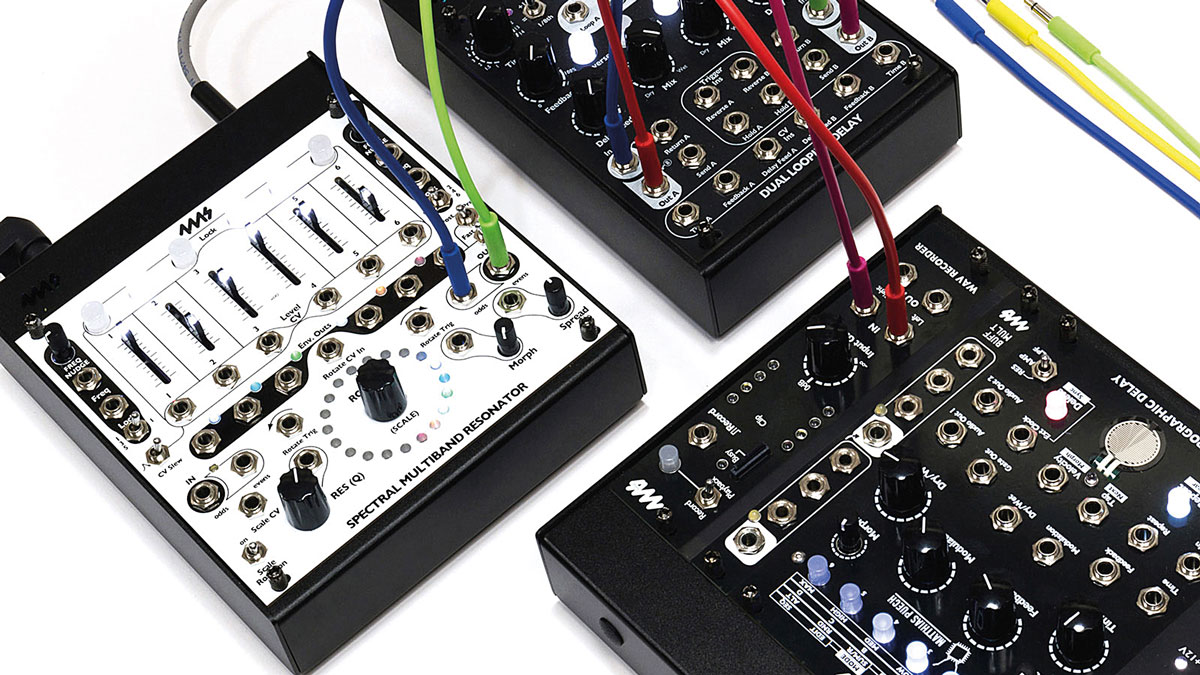MusicRadar Verdict
One of the most cheap and convenient routes into Eurorack, and a great travel solution, but size and depth can limit compatibility.
Pros
- +
Well priced.
Cons
- -
Very few.
MusicRadar's got your back
Eurorack developer 4ms has made it easier than ever to get into modular synthesis.
Housed in anodised aluminium, its Pod enclosures are lighter and shallower than other portable cases, and they’re available in a number of sizes based on HP width (20, 26, 32, 60 in powered and unpowered versions; plus powered 40 and 48 versions).
Most Pod enclosures weigh under 250g, with the powered versions adding extra heft (not including external power supply). Each Pod comes with stainless steel M3 screws and adhesive rubber feet for the bottom of the case.
The powered Pod 60 has four internal power headers whereas the other three models have only two. If you’re planning to plug in some additional modules, attach a multipower cable to one of the headers. The internal headers are keyed in order to keep you from connecting modules incorrectly.
Powered Pods require a power brick (sold separately). They support any universal laptop supply with a 2.1mm positive tip that provides 15-20V, but we recommend the 4ms 45W Power Brick, which gives you three amps and automatically handles 100V-240V (50-60Hz) input-perfect for international travel. Moreover, the powered Pods have a secondary power jack for daisy-chaining other powered Pods from the same Power Brick using the company’s 2.1mm barrel-connector cable (available in two lengths). A light inside the case indicates that it is receiving power.
Anyone interested in adding Eurorack to their tabletop setup should give the 4ms Pods a serious look
With the unpowered Pods, you can use the 4ms Row Power module and a flying bus cable or distribution board to connect your modules. We have a Nono Rover 1.60 portable case that uses a Row Power system and it has worked flawlessly. Row Power modules can also be daisy chained using a barrel connector.
Even packed with modules, the Pods are remarkably light and fit easily into a carry-on bag (though you’ll need to improvise a case to protect any knobs and switches on the modules). Fully loaded, my Pod 60 weighed just less than a kilogram, providing the easiest Eurorack travel experience we’ve had yet.
Want all the hottest music and gear news, reviews, deals, features and more, direct to your inbox? Sign up here.
An important aspect of using the Pods is finding modules that fit the 1.34” depth of the case. Recent 4ms modules do, but many Eurorack modules have circuitboards that exceed the depth. Also consider space requirements for the power cable for each module: these ribbon cables must fit between the module’s boards and the bottom of the Pod.
As we wanted to bring my 4ms Spectral Multiband Resonator along with my Pod 60 setup, we bought a powered Pod 26. Then, we powered it from the Pod 60 using a barrel cable - very convenient. In addition to being travel-friendly, the 4ms Pods provide a low-cost way to get started in modular synthesis - especially the powered models. Anyone interested in adding Eurorack to their tabletop setup should give the 4ms Pods a serious look.
Future Music is the number one magazine for today's producers. Packed with technique and technology we'll help you make great new music. All-access artist interviews, in-depth gear reviews, essential production tutorials and much more. Every marvellous monthly edition features reliable reviews of the latest and greatest hardware and software technology and techniques, unparalleled advice, in-depth interviews, sensational free samples and so much more to improve the experience and outcome of your music-making.

